
Antidote at the Sydney Opera House is marketed as a ‘festival of ideas, art and change’ and the 2022 line-up presented a diverse and intriguing list of topics from climate change to the war in Ukraine. Over the last few years, it feels as if the stability we have so long expected and taken for granted living in Australia has shifted. From the Black Summer bush fires, a global pandemic to the ever-present fear of climate change and the swings and roundabouts of Australian politics, the life we lead feels a little less certain, and the future we look towards, a little less bright.
My first time at the festival, I attended five talks on five very different topics to see if creating an open narrative for ideas can really be a catalyst for positive change.
Fatal Adaptation: Astrid Edwards, Danielle Celermajer, co-curated and hosted by Bri Lee
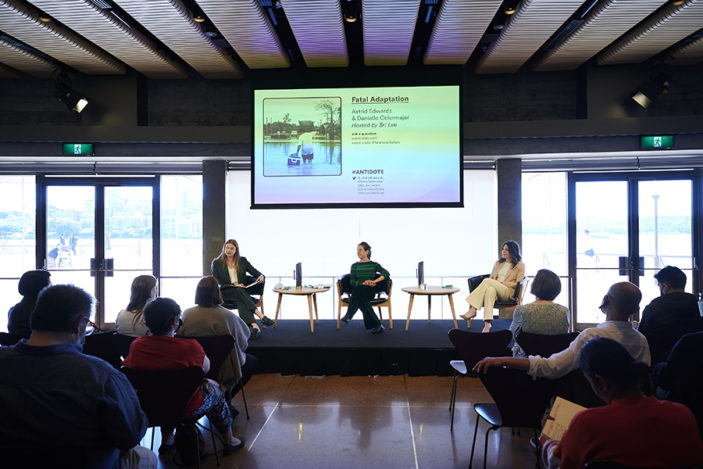
A 2021 report by The Australia Institute found that 75% of Australians are concerned about climate change. Over the last four years we have seen devastating bushfires, floods and a global pandemic completely disrupt our lives. It’s no longer a question of if climate change exists, but more a question of what we can do to stop it.
Former climate and environment policy consultant and teacher Astrid Edwards and Deputy Director of the Sydney Environment Institute Danielle Celermajer spoke with author Bri Lee about the state of our world and constructive ways to move forward.
Celermajer spoke about the impact of climate change within nature, on not just the animals but also the plant life and the soil – it’s so easy to forget these elements are living and suffering as well. Over 3 billion animals were killed in the 2019 – 20 Black Summer bushfires, and the activist urges people to “shift our minds from a world that no longer exists to the world we’re in.”
One way Edwards is combating her climate anxiety was to move from the city to rural Victoria and start keeping bees. While she acknowledges that supporting the bee population alone won’t stop climate change, it will help to support the eco system.
There was an interesting discussion about the idea of ‘hope’ – a word that both speakers have a complicated relationship with. Telling people with climate fear to ‘hope’ is offensive and a fairly useless sentiment. As Edwards comments, “we don’t need hope, we need courage… it’s action we’re looking for, it takes us to a better place.” But what does this action look like?
Celermajer recommends people don’t become attached to an outcome, and instead attach to the process and advises against any investment in fossil fuels or animal agriculture. Edwards encourages you to consider where your vote goes and hold your politicians accountable. And of course, look after the bees!
How To Have Sex: Chantelle Otten hosted by Lucinda Froomes Price
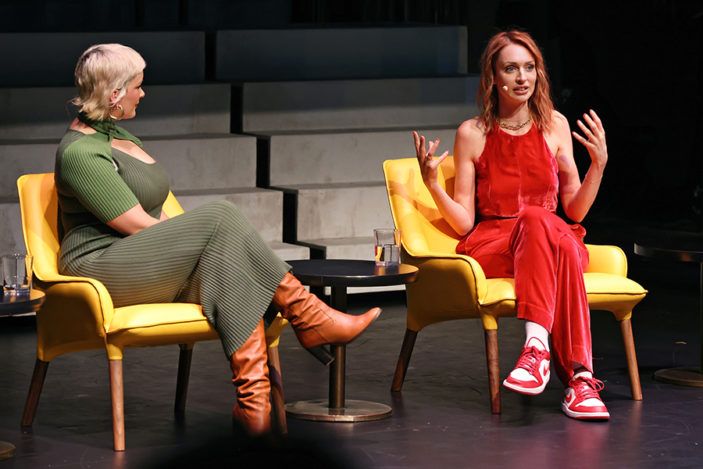
Watching Melbourne-based psychosexologist Chantelle Otten chat to writer, presenter and comedian Lucinda Froomes Price was like having a drink with friends and chatting about sex. Funny, relatable and incredibly interesting, it’s perhaps not surprising that this was one of the most popular talks of the day.
Otten explains that ‘sex’ is an “umbrella term” and it encompasses a lot more than simply “penis in vagina”. She encourages people to view sex as less goal-orientated and more pleasure-orientated. There were discussions about desire and how this doesn’t need to be purely about sex, often a person can desire intimacy or emotional closeness – and there is nothing wrong with that.
Otten spoke openly about the shame that often surrounds sex and particularly masturbation commenting, “No one is born with shame around our body – it’s something we’re taught.” The upside of this being that we can also be taught to love our body.
Interestingly (and not surprisingly) 70% of vulva owners can’t orgasm through penetrative sex alone and shockingly you orgasm better with your socks on – who knew! With ‘designer vaginas’ becoming increasingly normalised, it was beautiful to hear Otten speak about vulvas like snowflakes – “individual and perfect.” It was also amazing to hear a woman say the word ‘vulva’ ten times without embarrassment. This is what normalising instead of sexualising women’s bodies feels like. It also means we can discuss menstruation and the struggles that often come with being a human that bleeds monthly, without someone telling you it’s gross.
It was refreshing to hear a woman speak so openly and honestly about sex and bodies, encouraging people to communicate with their partners and to make sex and intimacy fun – in whatever form that takes. A poignant takeaway was when Otten said, “we have to be a lot kinder and empathetic when talking about sex with each other” – and today’s talk was a great place to start.
How Do You Solve A Problem Like The Media?: Barrie Cassidy, Osman Faruqi & Janine Perrett, hosted by Maddison Connaughton
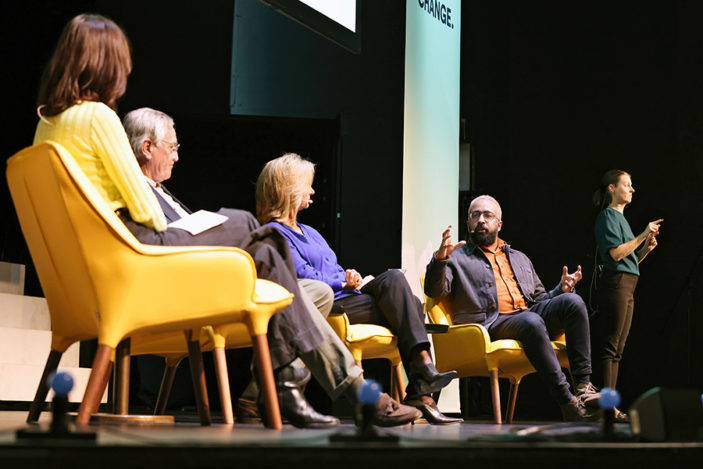
I have long had issues with how mainstream media presents headlines – in particular around issues pertaining to women – where sexism and racism seem to dictate the newsrooms. Each member of the panel, including host Maddison Connaughton, have extensive experience as journalists so I did wonder how much certain publications and journalists would be scrutinised in this discussion.
A main topic of conversation was coverage of the recent election, with Barry Cassidy making the valid observation that the media call elections like a football game – ignoring the three years that have proceeded it. The implication is that it only matters how a political party performs during an election period and not before.
Osman Faruqi believes that one of the biggest issues is with the newsrooms themselves, commenting, that it’s a “narrow class of people who run the media and work in it – this is becoming more obvious over time”. This means that often the news does not actually reflect the issues that Australians care about, instead it becomes a reflection of the largely white, Eastern Suburbs and North Shore-based journalists.
It was largely agreed that the threat of defamation is what stops journalists and publications speaking out against anyone with power or money, with Janine Perrett commenting, “Defamation is the greatest threat to mainstream journalism.”
Perrett also spoke about the rise of the opinion piece and how, once upon a time, you needed to have actual experience to have a valid opinion – but not anymore. Faruqi agrees, adding that opinion pieces are cheaper to produce and receive higher engagement online. Who here hasn’t been the victim of click-bait?
The biggest question of the talk centred around responsibility. Who’s at fault? The media for generating such poorly researched, lazy journalism, or us – the audience who continues to consume it. While audiences are getting smarter and questioning more than ever what they read, there is a large segment of the population who only receive news via social media, and this is largely opinion based. Faruqi presented a great example of this with the Johnny Depp and Amber Herd trial, where platforms like TikTok and YouTube were presenting opinions as if they were news and effectively showed a distorted view of the facts.
So what’s the solution? Honestly, no one really knows, but according to the panel, having credible news outlets start infiltrating social media platforms is a good place to start.
It Happened To Me: Dai Le, Nardi Simpson, Dinesh Palipana OAM, Antoinette Lattouf and others, hosted by Steph Tisdell
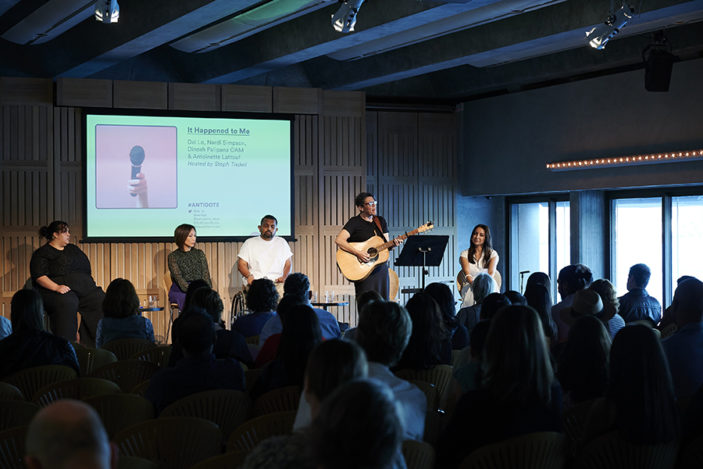
Personal narratives have the power to inspire, transform and completely change your perspective.
Dai Le, who was recently re-elected to Fairfield City Council and also elected Deputy Mayor, spoke about her childhood in Vietnam. Fleeing the country at age 7 she ended up in a displaced peoples camp in the Philippines with her family and for three years she would not receive any proper education. Next stop was Hong Kong where she would work in a factory before being resettled in Australia in 1979. Le’s story is one of perseverance and hope and she continues to be a strong voice for diversity and inclusion in the community.
Dinesh Palipana OAM is a doctor, lawyer and disability advocate. Arriving in Australia at age 10 from war torn Sri Lanka, Palipana was involved in a car accident that left him with quadriplegia. While he has an incredible outlook on his life now, commenting, “This didn’t happen to me, it happened for me”, this was not always the case. Palipana touched on what his life was like living with depression and realising he had to do something, commenting, “Being a prisoner of my mind was far worse than being a prisoner of my body.” You could hear a pin drop in the room, so enthralled was the audience by his inspiring journey.
A multi-award-winning journalist and diversity advocate, Antoinette Lattouf spoke about how racism is portrayed through the media, citing stories around terrorist Brenton Tarrant who murdered 51 people in a mosque in Christchurch in 2019. Tarrant, a white man, was not labelled a terrorist in these headlines, instead they talked about how he was a ‘great athlete’ and showed cute baby photos. This would not have happened if he had been a person of colour. Lattouf spoke of her overwhelming anger at this double standard, commenting, “It’s ok to be angry, but anger alone is futile.” This rage needs to be acknowledged and channelled otherwise you risk becoming the thing you hate. This was eye-opening and again encourages people to never stop questioning what you are fed by mainstream media.
Nardi Simpson is a Yuwaalaraay writer, composer, playwright, and educator, as well as a musician and performer in the Stiff Gins. Telling a story enriched with Country and the accompanying song – it was absolutely stunning to watch. We were taken on a journey, transporting us far beyond the four walls of the room we were seated in, to a land rich with tradition and steeped in history. It’s difficult to describe why Simpson’s words were so powerful and so moving. In the pause after the final notes were played you could sense the audience was letting the music soak in before bursting into applause.
Host Steph Tisdell was absolutely brilliant. She managed to inject some humour and levity into the talks, and we were also gifted a piece of her own story as well. This session was truly a great reminder that everyone has a story.
Ukraine Has Changed Us: Maria Tumarkin, Serhiy Zhadan, Billie Tumarkin, Anatoli Torjinski & Olga Boichak
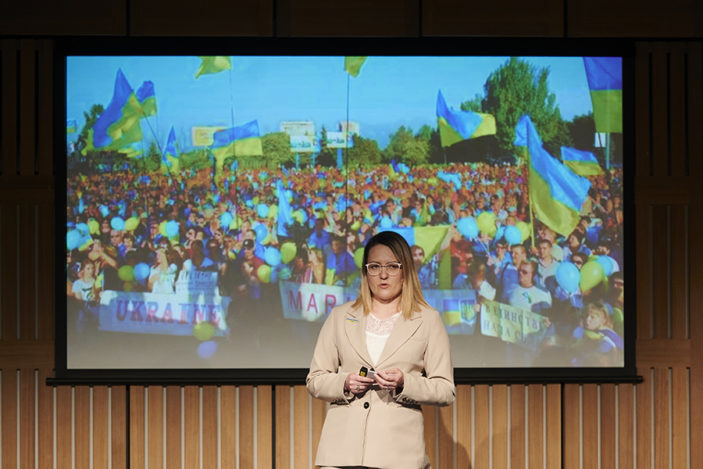
The last session of the day carved out time and space to pay tribute to all those affected by the war in Ukraine. Musicians, poets, writers and academics came together to present their response to an event that continues to cause devastation for so many. This day marked 200 days since Russia invaded Ukraine. It is the largest refugee crisis since the Second World War. So why have we stopped talking about it?
The session began and ended with the incredible musical talents of Anatoli Torjinski on cello and Billie Tumarkin with vocals. Not understanding Ukrainian I had no idea what words were being sung, but that didn’t matter. The rhythm was haunting and incredibly moving. It truly embodied what this session was all about.
A Lecturer in Digital Cultures at the University of Sydney, Olga Boichak discussed networks of resistance within Ukraine, in particular civilian resistance. ‘Craftivism’ is a form of resistance that challenges the status quo by engaging in craft. Groups of people will gather together and weave camouflage nets which can be used to hide weapons from drones taking photographs. These acts of rebellion are clever, uniting and very effective.
Well-known Ukrainian writer and poet Serhiy Zhadan wrote three new poems especially for Antidote and a video of him reciting them was played. One poem in particular spoke of brave snails, “you are deprived of a home but not deprived of a heart”. This vision of snails carrying everything they own on their backs, as their homes are destroyed, it was heart-wrenching. His words spoke of courage and perseverance.
Author Maria Tumarkin was born and raised in Kharkiv, Ukraine. Her words are full of passion and fire. The war in Ukraine has been going on for eight years, she says, don’t turn your backs on it now. Remember the war, she pleads. People continue to talk of peace, but it is not peace but victory that is needed now. Her words are laced with urgency as she comments, “Pain and hope unite us.”
This war is not over. Not for the incredible speakers and performers here. Not for the people in Ukraine. Not for us. Remember the war.
Antidote was a roller-coaster of ideas and inspiration. One thing that became clear was that in order to create positive change, we must first face the problem, and that problem, more often than not, resides within us. Speaking about change can be empowering and motivating, but without action it’s just white noise. It’s time to speak up – if not now, when?
FIVE STARS (OUT OF FIVE)
Antidote was held on the 11th of September 2022.
For more information head to the Sydney Opera House website.
Photos by Jaimi Joy and Prudence Upton
